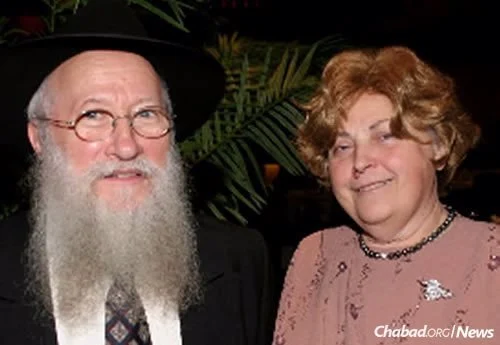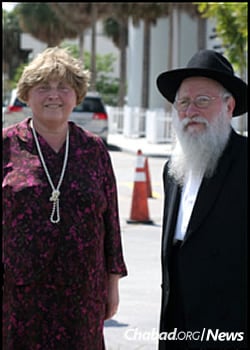
Rabbi Avraham Korf, 92, Pioneering Director of Chabad-Lubavitch of Florida
Rabbi Avraham Korf, regional director of Chabad-Lubavitch of Florida and a trailblazing emissary whose work transformed the Jewish landscape of the southeastern United States, passed away on Monday evening, July 7, at the age of 92.
A beloved figure in Florida’s Jewish community and one of the longest-serving shluchim in the world, Rabbi Korf is credited with bringing close to 400 emissary couples to the state, and overseeing the establishment of hundreds of Chabad centers in cities, suburbs, and college campuses across Florida, serving the Jewish needs of the entire state.
Born in 1933 in Kharkov, USSR, Rabbi Korf was raised in a family steeped in mesirat nefesh, self-sacrifice to maintain and grow Jewish life in the Soviet Union. His father, Rabbi Yehoshua Korf, was a noted Chassid who courageously upheld Jewish life under Soviet repression.

With the outbreak of World War II, the family fled to Samarkand, Georgia. In 1947, they escaped the Soviet Union during the “Great Escape” organized by Chabad Chassidim, traveling alongside Rebbetzin Chana Schneerson, mother of the Rebbe—Rabbi Menachem M. Schneerson, of righteous memory.
After a brief stay in a displaced persons camp in Poking, Germany, young Avraham studied at the Lubavitch yeshivah in Brunoy, France, before arriving in the United States in 1953, where he merited his first audience with the Rebbe.
In 1960, he married Rivka Eichenbaum, and their wedding was one of the last at which the Rebbe personally officiated as mesader kiddushin. When another chassid requested that honor and mentioned the Korfs’ upcoming wedding that the Rebbe was going to officiate, the Rebbe replied that they were planning to be his emissaries.
Later that year, at the Rebbe’s direction and following a request from the Rebbe’s secretary, Rabbi Chaim Mordechai Aizik Hodakov, the Korfs relocated to Miami, Florida, where they began their lifelong mission of building Jewish life from the ground up.

Until the 1940s, most of the state’s Jewish residents were concentrated in the northern ocean port of Jacksonville, but migration southward—coupled with an influx of retirees from out of state, and a swell of Jewish immigrants from Latin America and the Caribbean—established Miami as Florida’s new Jewish hub. By 1960, the state had about 175,000 Jewish residents.
In a 2010 interview with Chabad.org days before a 50th-anniversary gala event celebrating his and his wife’s launch of Chabad activities in Florida, Rabbi Korf recalled that Miami had only three synagogues at the time, while Florida as a whole had just two ritual baths.
When the young couple arrived, milk adhering to the strict kosher standard known as chalav Yisrael was unheard of. He found a local dairy and supervised the milking of cows himself.
For meat, the rabbi would shecht chickens, and his wife would salt and soak them.
Said the rabbi: “When we first came here, there was no glatt kosher meat, no glatt kosher restaurant, no kosher bakery. Everything we needed, we had to bring or ship or find.”
Within a few years, they had opened a Chabad House and established mikvaot. They launched a summer camp despite facing local opposition and antisemitism that required legal battles to secure land.
Under Rabbi Korf’s leadership, a small Torah class grew into a vast educational network. He founded the Lubavitch Educational Center, now serving nearly 3,000 children.
“It started off with six children,” Rabbi Korf said of the school, “then 32 children the next year, then 67, and then hundreds. As people started hearing about it, it grew.”
Feige Knight, who was known back then by the name Teri Veccica, was one of the Korfs’ first students at the yeshiva. She was only six years old when her non-religious family sent her to the school.
“My mother and my grandmother took me to the first [Jewish] school they’d heard of opening in Miami Beach,” says Knight. “Rabbi Korf is the reason that I was able to get a Jewish education. I hold him dear to my heart, and I give him the credit for not allowing my mother to walk out of that office.”
The children hardly saw their father during the week, so the holy day of Shabbat was a special time for the family. He would catch up with them and quiz them on their studies. Jacobson remembers being one of the only visibly religious students at her parents’ school, but it didn’t bother her.
“We just knew it was the reason why we were there,” she said. “There was never any judgment.”
There also wasn’t much money.
“We lived on a shoestring budget,” explained Jacobson. “But we had such inner pride in what we were doing. That came from my father. He lived it and breathed it.”
An example was when she was in her second year of post-high school seminary in New York and had a job teaching fifth grade at a boys’ school. She earned $15 an hour and were about to up it to $25 when Beth Rivka offered her a job for just $100 a week. She turned it down.
“Well, somehow my father got wind of this,” she recalled. “I told him it didn’t make sense to take the job and get a quarter of the pay.”
“Leah,” said Korf, “if those were my calculations, the money, I would never have gone [to Florida]. I didn’t raise my children to make those calculations.”
He also founded the Yeshiva Gedolah of Greater Miami in 1972, creating a bastion of Torah and incubating countless Chabad rabbis.
Since the young rabbi did not know English well, he would share with his wife the lessons he planned to teach to college students in Yiddish, and she would teach him the English words to use.
He was instrumental in guiding the construction and restoration of mikvaot across the state, and became internationally recognized as an expert in mikvah construction, frequently traveling to provide halachic guidance and support to Jewish communities worldwide.

Perhaps Rabbi Korf’s most enduring legacy is the generation of shluchim he inspired and mentored. Nearly 400 emissary couples serve today in cities and campuses across Florida, many of whom were personally recruited and guided by Rabbi Korf himself.
Yet, even as the empire he oversaw expanded beyond anyone’s wildest imagination, he remained as unpretentious as ever. Even in the sweltering Miami heat, he would walk the streets in his long frock and black hat, an authentic figure from the shtetl transported into South Beach.
With his heavily accented English, he taught Torah one-on-one, guided, counseled and encouraged everyone to do just one more mitzvah.
Rabbi Korf passed away after nightfall, when the Hebrew date crossed into the 12th of Tammuz, the birthday and anniversary of liberation of the Previous Rebbe, Rabbi Yosef Y. Schneerson, of righteous memory, under whose wing Rabbi Korf grew as a young man into the legendary leader he became.
Predeceased by his wife Rivka in 2017, Rabbi Korf is survived by his children, Rabbi Yossi Korf (Hollywood, Fla.); Rashi Raices (Postville, Iowa); Shevi Sossonko (Miami Beach, Fla.); Rabbi Benjy Korf (Miami Beach, Fla.); Leah Jacobson (Brooklyn N.Y.); Mendy Korf (Miami Beach, Fla.); Motty Korf (Miami Beach, Fla.); Rabbi Zalman Korf (Walnut Creek, Fla.); Sari Korf (Miami Beach, Fla.); and many grandchildren and great-grandchildren; along with the thousands of lives he touched through his decades of service.
A more extensive tribute is being prepared.











And
Mrs. Batsheva Shemtov, Oak Park, MI is a surviving sister. May she live long, healthy years.